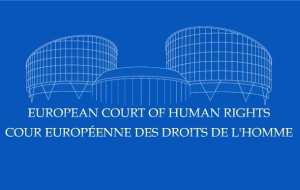Telegram complained of Russia to the European Court of Human Rights
 Two days ago, on March 20, 2018, Roskomnadzor sent a notice to Telegram about the need to provide the federal executive body for security (the Federal Security Service of Russia) with keys to decrypt user correspondence. In October 2017, the company was already charged a fine of 800 thousand rubles, the next step is to send a notification, and then blocking at the level of telecom operators.
Two days ago, on March 20, 2018, Roskomnadzor sent a notice to Telegram about the need to provide the federal executive body for security (the Federal Security Service of Russia) with keys to decrypt user correspondence. In October 2017, the company was already charged a fine of 800 thousand rubles, the next step is to send a notification, and then blocking at the level of telecom operators.“In accordance with Part 1 of Art. 15.4 of Law No. 149-FZ, the above obligations must be fulfilled within 15 days from the date of receipt of this notice, ”stressed in Roskomnadzor.
The founders of Telegram firmly intend to resist any attempts at an attempt on the freedom and privacy of users, as Pavel Durov immediately stated .
')
Today it became known that the company filed a complaint with the European Court of Human Rights (ECHR) against the decision of the Meshchansky Court, which fined her 800,000 rubles. for refusing to provide the FSB with user encryption keys. This was reported to Vedomosti by the lawyer of the International Agora, Damir Gainutdinov, who represents Telegram at the ECHR.
The essence of the Telegram Messenger complaint is that bringing the company to administrative responsibility violates the right to freely distribute information without the intervention of the authorities and regardless of state borders, guaranteed by Art. 10 of the Convention for the Protection of Human Rights and Fundamental Freedoms . Members of this Convention are all countries of Europe, except Belarus. The international treaty was signed in 1950 and entered into force on September 3, 1953.
Article 10
Freedom of expression
1. Everyone has the right to freely express their opinions. This right includes the freedom to hold opinions and the freedom to receive and impart information and ideas without any interference from public authorities and regardless of state borders. This article does not prevent States from licensing broadcasting, television or cinema enterprises.
2. The exercise of these freedoms, imposing duties and responsibilities, may be subject to certain formalities, conditions, restrictions or sanctions that are provided for by law and are necessary in a democratic society in the interests of national security, territorial integrity or public order, in order to prevent unrest and crime, for the protection of health and morals, the protection of the reputation or rights of others, to prevent the disclosure of information received in confidence or secured authority and impartiality of justice.
Telegram lawyers will try to prove to the court that the Russian authorities did not try to strike a balance between the need to ensure public safety and protect the rights of citizens to respect for private life. In particular, the Federal Security Service (FSB) requires unlimited access to confidential correspondence of six users, without providing judicial acts allowing access and establishing security guarantees for the transmitted information, which is critical for ensuring the security of correspondence of all users of the service.
The rights enshrined in the Convention for the Protection of Human Rights are also enshrined in the Constitution of the Russian Federation. Therefore, the trial begins in Russia. A week ago, the public organization "Roskomsvoboda", whose activities are aimed at countering censorship on the Internet, promoting the ideas of freedom of information and self-regulation of the Internet industry, announced the start of the public campaign "The Battle for Telegram" .
Within this company, a class action was filed on behalf of 35 Telegram users against the FSB. The lawsuit was filed in the Meshchansky Court of Moscow.
"Roskomsvoboda" declares that certain provisions of the Federal Law No. 97-FZ of 05/05/2014 and No. 374-FZ of 07/06/2016, and joint actions of the FSB and Roskomnadzor limit the constitutional rights of Runet users, and specifically:
- Article 23 of the Constitution of the Russian Federation
Everyone has the right to confidentiality of correspondence, telephone conversations, postal, telegraph and other communications. Restriction of this right is allowed only on the basis of a court decision. - Article 24 of the Constitution of the Russian Federation
Collection, storage, use and dissemination of information about the private life of a person without his consent are not allowed. - Article 29 of the Constitution of the Russian Federation
Everyone has the right to freely seek, receive, transmit, produce and distribute information in any legal way.
The requirements of the FSB and Roskomnadzor will be appealed in courts, including the Constitutional Court of the Russian Federation, the Supreme Court of the Russian Federation and the European Court of Human Rights.
In a complaint to the ECtHR, Telegram expresses the opinion that the Russian courts "actually took upon themselves the functions of the prosecution." In particular, the case of Telegram, which affects the interests of 100 million people, was considered by the justice of the peace alone - in the absence of a lawyer, a representative of the FSB and the state prosecutor.
Thus, there are reasonable grounds for believing that Russian courts are not able to protect citizens of the Russian Federation and to ensure respect for their constitutional rights . According to experts, to confirm this thesis in the EPRS will not be a particular problem.
On March 20, the Supreme Court of Russia rejected Telegram’s claim to the Federal Security Service regarding the decryption of messages. A company spokesman said Telegram would appeal the court’s decision.
Source: https://habr.com/ru/post/410995/
All Articles